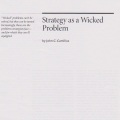
Apollo Hospitals: Touching a Billion Lives
Apollo Hospitals has transformed the healthcare landscape in India. The Government of India has recognized the profound importance of Apollo Hospitals, even issuing a postage stamp in its honor. Apollo Hospitals' Managing Director, Ms. Preetha Reddy, describes Apollo's vision and the strategy that has created this globally recognized, iconic organization in the healthcare arena. View Video

EMCO: Identity and Strategy
EMCO, a private company in the fast moving consumer goods industry in the Czech Republic, is very much a reflection of the values and aspirations of its founder and CEO Ing. Zdeněk Jahoda. A 1991 startup enabled by the Velvet Revolution, now with over a billion crowns in sales, EMCO is an iconic example of Czech entrepreneurial success. EMCO's identity - its values, aspirations and competencies - drives its strategy and its success. View Video

ALCOA: Values-Driven Organizational Transformation
Alcoa has received much attention because of its unequivocal commitment to safety as its highest priority. Environmental and social sustainability are also significant considerations in Alcoa’s strategic decision-making. This case focuses on two Russian aluminum plants acquired in 2005 and describes how these priorities guide Alcoa’s integration and turnaround efforts. The plants were old and dilapidated, with poor employee productivity and a high incidence of industrial accidents. Alcoa invested approximately $490 million to modernize the plants and improve the safety record and to implant the core values of the corporation.
This case was written by Dr. Frances M. Amatucci, Associate Professor, at Slippery Rock University of Pennsylvania. The author gratefully acknowledges the assistance of William O’Rourke, former Vice President of Sustainability and Health, Environment and Safety (HES) at Alcoa and President of Alcoa Russia, who arranged for access to Alcoa’s facilities in Moscow and Samara. View Case - PDF

Strategy as a Wicked Problem
This article in the May 2008 issue of Harvard Business Review describes and addresses the challenge posed by the extreme complexity and uncertainty characterizing many strategic issues faced by companies today. These strategic issues are not just tough or persistent; they are "wicked" - a label used by for problems that cannot be definitively resolved. Poverty and terrorism are classic examples. A wicked problem has innumerable causes, morphs constantly, and has no correct answer. It can be tamed, however, with the right approach. This article explains how executives can tell if they are dealing with a wicked strategy problem and how they can conquer such problems. View PDF

Towards a Stakeholder Theory of Strategic Management
The economic logic underlying a focus on shareholder value as the singular goal of firms is examined by Dr. Joseph Mahoney, Investors in Business Education Professor of Strategy & Director of Graduate Studies at the College of Business of the University of Illinois at Urbana-Champaign. Dr. Mahoney identifies the assumptions on which increasing shareholder value is proposed as the sole objective of businesses. He presents the evolving thinking about the validity of these assumptions and develops the economic logic for adopting a much broader "stakeholder" theory as a more realistic and appropriate basis for strategic management decisions. View Power Point Presentation

Perspectives on the Business of Humanity®: An Interview with Dr. John T. Delaney
Dr. John Delaney, former Dean of the Katz Graduate School of Business and College of Business Administration, University of Pittsburgh and current Vice President of Academic Affairs at St. Vincent College, shares his views on the "business of humanity;" its significance and meaning for businesses, and its relationship to his vision and strategy for the business school. View Video

Perspectives on Innovation Ecosystems, Transnational Relationships and Entrepreneurship
An interview with Mr. Kiran Karnik, President of NASSCOM, the industry association of Information Technology (IT), Information Technology Enabled Services (ITES) and Business Process Outsourcing (BPO) firms in India. The topics discussed include innovation ecosystems, transnational relationships, the role of academia in promoting innovation, and the future of the IT in India. View Video

Perspectives on India, Bangalore and the Indian Consumer
Drawing from her experience as senior business correspondent for two of India's leading newspapers, the Deccan Herald and the Deccan Chronicle, Ms. Sangeetha Chengappa offers an insider's perspective on the Indian business context and the phenomenon that is the city of Bangalore. Her analysis of the Indian consumer provides insights into the characteristics of urban and rural consumers. She points out that the rural segment is the core of the "bottom of the pyramid" in India, that it constitutes seventy percent of the population and that its purchasing power is growing more rapidly than that of the urban segment. Ms. Chengappa describes distinctive aspects of the strategies of companies that have successfully addressed the needs of the important rural segment and identifies the most dynamic and promising sectors of the Indian economy. View Video
Linking Innovation Ecosystems Across National Boundaries Symposium
The challenge of linking innovation ecosystems across national boundaries ensuring win-win outcomes for both countries and avoiding the significant potential perils is the focus of this video. The two countries considered are U.S.A and India. The negative strategic and long-term viability implications for firms engaging in "high-end" outsourcing, involving domain and technological knowledge, are addressed. View Notes
Overview of the Business of Humanity® Project: An Interview with Dr. John C. Camillus
Overview of the Business of Humanity® Project: An Interview with Dr. John C. Camillus. View Video
